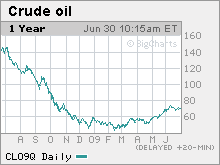Oil falls near $69
Government data shows gasoline supplies rose by 2.3 million barrels last week.
Find Your Next Car
NEW YORK (Reuters) -- Oil fell toward $69 a barrel Wednesday after government data showed a build in U.S. gasoline inventories ahead of the Independence Day holiday, traditionally the peak of the summer driving season.
Gasoline stockpiles in the world's top consumer rose by 2.3 million barrels last week, above analysts forecasts, data from the U.S. Energy Information Administration showed.
Distillate inventories, including diesel, increased by 2.9 million barrels, while crude stockpiles fell by 3.7 million barrels.
U.S. crude traded down 58 cents to settle at $69.31 a barrel Wednesday, after earlier rising as high as $71.85.
"The fact that gasoline stocks are up 2.3 million barrels ahead of the Fourth of July weekend is huge," said Stephen Schork, editor of The Schork Report, adding, "Demand is low."
The economic crisis has battered fuel demand, sending crude off record highs over $147 a barrel hit last July. But optimism that a potential economic recovery could push demand higher has helped lift crude off lows below $33 a barrel touched in December.
Total U.S. product demand fell 5.8% over the four weeks to June 26 compared to year-ago levels, according to the EIA report.
The stockbuilds outweighed optimism in equities markets, with U.S. stocks rising on improving prospects for manufacturing around the world and suggestions the global economy was recovering.
Further pressure on crude came after a Reuters survey showed OPEC output rose in June, with members' compliance with agreed cuts at 72% last month, a fall from 75% in May.
The producer group last year agreed to a series of output cuts aimed at taking 4.2 million barrels per day of crude off the market to help stem the slide in crude prices.
Kuwait's oil minister said OPEC is unlikely to raise output when it meets again in September if markets remain oversupplied.
Output from OPEC member Nigeria has dropped over the past month due to an escalation of civil unrest in its oil-rich Niger Delta region. Tuesday, oil major Royal Dutch Shell (RDS.A) said attacks by Nigerian militants had cut its onshore output to around half of what it was producing earlier this year. ![]()



